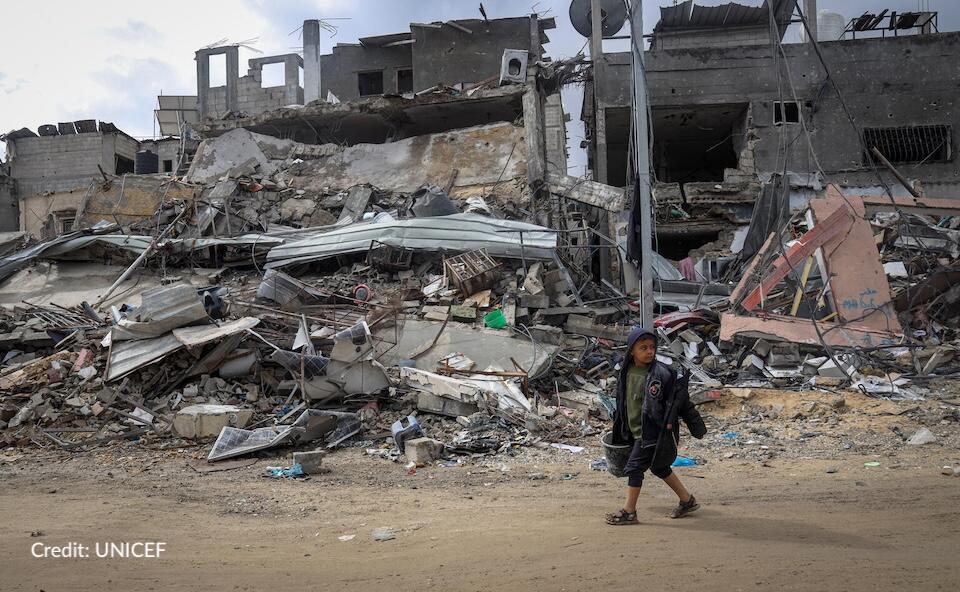Amman/New York, December 23, 2024 – The top UN coordinator for humanitarian affairs said civilians in Gaza desperately need massive humanitarian aid but it is now “almost impossible” to deliver the live-saving supplies while Israel continues to deny “meaningful access” to those in need and armed local gangs looted the supplies.
Tom Fletcher, the UN Under-Secretary-General for Humanitarian Affairs and Emergency Relief Coordinator, said in Amman following his first visit in some Middle East regions that the constant and sustained intensity of violence in Gaza has reduced schools, hospitals and civilian infrastructure to rubble.
“We deal with tough places to deliver humanitarian support,” Fletcher said. “But Gaza is currently the most dangerous, in a year when more humanitarians have been killed than any on record.
As a result, despite the massive humanitarian needs, it has become almost impossible to deliver even a fraction of the aid that is so urgently required. The Israeli authorities continue to deny us meaningful access – over 100 requests to access North Gaza denied since 6 October. We are also now seeing the breakdown of law and order and the systematic armed looting of our supplies by local gangs.”
“I call on the international community to defend international humanitarian law, demand protection of all civilians, insist that Hamas release all hostages, defend UNRWA’s vital work, and break the cycle of violence. I pay tribute to the humanitarians working to save the lives of civilians in these conditions.”
UN warns Gaza has become a graveyard
The UN and its humanitarian partners are warning that living conditions for Palestinians in Gaza have become worse as heavy winter rains, hunger and war have transformed the enclave into what they called “a graveyard.” The aid workers said people are dying from hunger and diseases as well as from military strikes since the Israel-Hamas war that broke out on October 7, 2023.
The head of the UN aid coordination office in Gaza, Georgios Petropoulos, issued on December 19 a harrowing update on the dire situation in Gaza, describing it as “the most dangerous place on earth right now,” UN news reporte
Speaking to correspondents on December 19, the senior official of the UN Office for the Coordination of Humanitarian Affairs underscored the grim reality facing over two million people trapped in Gaza, where basic necessities like food, shelter, and safety have become scarce.
“Dying hungry and in pain” is an increasingly likely outcome for children, mothers, aid workers, and teachers alike, he said. “We’re there to support the people who for more than 14 months have struggled to stay alive. But we’re not allowed to do our jobs.”
The humanitarian office has been striving to deliver food, healthcare, and safe drinking water to Gaza’s besieged population, but fuel shortages and blocked access routes have exacerbated the crisis. Petropoulos said these efforts have been opposed by what he referred to as “blanket prohibitions” from Israeli authorities.
“When we raise these things with Israeli authorities, they reject virtually every single practical solution that we table,” Petropoulos said, adding that “the aid system has been weaponized.”
He further revealed that aid delivery often becomes a race against time, with insufficient supplies to meet the growing needs of the population.
“As an aid worker in Gaza, you’re forced to make horrible decisions,” he described. “Should I let people die of starvation or of the cold? Do we bring in more food to ease hunger or more plastic sheets for some shelter from the rain at night?”
Echoing that warning, the UN Children’s Fund highlighted widespread and dangerous malnutrition levels in the enclave, where more than 96 per cent of women and children in Gaza “cannot meet their basic nutritional needs,” said Rosalia Bollen, the UNICEF communication specialist.
Speaking from Amman, Bollen noted that the most northerly part of Gaza has been under a near total siege for 75 days. This has largely prevented humanitarian assistance from reaching youngsters in need there “for more than 10 weeks”, she said.
“The suffering is not just physical, it is also psychological…Children are cold, they’re wet, they’re barefoot; I see many children who still wear summer clothes and with cooking gas gone, there’s also lots of children I see scavenging through piles of garbage looking for plastic they can burn.”
Louise Wateridge, the senior Emergency Officer of the UN agency for Palestinian refugees, said, “The world is not seeing what’s going on with these people, it’s impossible for families to shelter in these conditions.”
Speaking from Nuseirat in central Gaza after heavy winter rains, Wateridge insisted that “an entire society here is now a graveyard…Over two million people are trapped. They cannot escape. And people continue to have basic needs deprived and it just feels like every path here that you could possibly take is leading to death.”
The UN said since war erupted on October 7, 2023, after Hamas-led terror attacks in Israel, at least 45,059 Palestinians have been killed with 107,041 injured. Citing the Israeli military, the UN humanitarian office noted that between October 7, 2023 and December 17, 2024, more than 1,586 Israelis and foreign nationals have been killed, the majority on October 7, 2023 and its immediate aftermath. This number includes 386 soldiers killed in Gaza or along the border in Israel and 2,488 injured since the beginning of the ground operation. It is estimated that 100 Israelis and foreign nationals remain hostage in Gaza, including those declared dead and whose bodies have not been released. (By J. Tuyet Nguyen)
United Nations journalists – United Nations journalists – United Nations journalists
United Nations News – United Nations News – UN Correspondents Association – UNCA Awards

